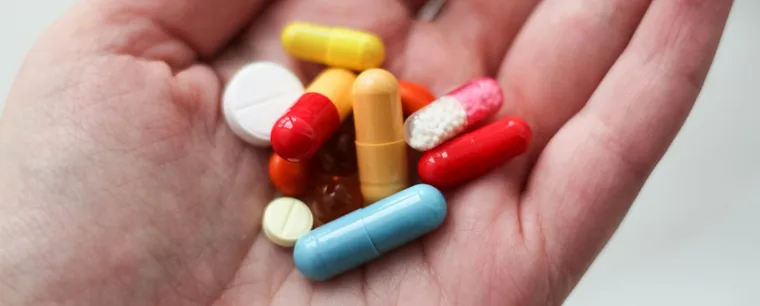AFib patients should never stop or change medications on their own. A cardiologist can review your prescriptions and recommend safe alternatives when necessary.
Common Medications Used for AFib Treatment
- Blood Thinners (Anticoagulants) – e.g., warfarin, Xarelto (rivaroxaban), Eliquis (apixaban).
- Rate-Control Drugs – beta-blockers (metoprolol), calcium channel blockers (diltiazem, verapamil).
- Rhythm-Control Drugs (Antiarrhythmics) – amiodarone, flecainide, sotalol.
Medications That May Trigger or Worsen AFib
- Decongestants with Pseudoephedrine
- Found in cold & flu remedies.
- Can raise blood pressure and heart rate.
- Stimulants (Caffeine, Energy Pills, ADHD Medications)
- May increase irregular heart rhythms.
- Certain Antidepressants
- Tricyclic antidepressants (TCAs) may affect heart rhythm.
- Non-Steroidal Anti-Inflammatory Drugs (NSAIDs)
- Ibuprofen, naproxen — may increase AFib risk in long-term use.
- Corticosteroids
- Long-term use may raise arrhythmia risk.
- Some Antibiotics
- Macrolides like azithromycin may rarely cause rhythm disturbances.
- Overuse of Alcohol & Herbal Stimulants
- Can interact with AFib medications and trigger episodes.
Side Effects of AFib Medications
- Blood thinners → bleeding risk.
- Beta-blockers → fatigue, low blood pressure.
- Antiarrhythmics → dizziness, thyroid issues (amiodarone).
Don’t Take These Medications if You Have AFib
Some common drugs can worsen atrial fibrillation or trigger new episodes. Decongestants containing pseudoephedrine, certain stimulants, non-steroidal anti-inflammatory drugs (NSAIDs), and select antibiotics may all pose risks. Patients with AFib should avoid these medications unless specifically approved by a cardiologist. Even herbal stimulants and excessive caffeine can interfere with heart rhythm. Always review new prescriptions or over-the-counter medications with your healthcare provider to prevent complications.
Safe Management Steps
- Always check with your doctor before starting any new prescription or over-the-counter medication.
- Inform your pharmacist about your AFib diagnosis.
- Keep a list of all medications and supplements.
Conclusion
While some medications are essential for managing AFib—like blood thinners and rate controllers—others can unintentionally aggravate the condition. Decongestants, NSAIDs, certain antibiotics, and stimulants can all pose risks. Always consult your cardiologist or healthcare provider before starting or stopping any medication to ensure safe and effective AFib management.
References
- A-FIB.com – Decongestants that may trigger AFib drafib.com
- BMJ – NSAID use and risk of atrial fibrillation BMJ
- EHJCVP (Oxford Academic) – NSAID-associated AF risk post-MI Oxford Academic
- MDPI (Frontiers in Cardio Med) – Macrolide cardiovascular toxicity meta-analysis Frontiers
- Verywell Health – Medications to avoid for AFib Verywell Health

